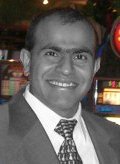|
|
|
Computing, Libraries, Tennis, India & other interests of Vikas Kamat
| Amembal Dinkarrao |  | | D'Amel or Amembal Dinkarrao (1909 – 1990) Guest Entry by Prakash G. Burde
If alive, Amembal Dinkarrao or D'Amel would have been 95 on September 24. Old time listeners of All India Radio would recall fondly his innumerable compositions used again and again as signature tunes. D'Amel is rightfully called as the Father of Orchestration of Hindustani classical music. It is necessary to differentiate in simple terms how difficult it must have been to set Indian or Hindustani classical themes, melodic and individualistic in nature in orchestration which is infact harmony based as is Western classical music. This very quality highlights the contributions of D'Amel. Though not trained in true Guru-Shishya Parampara in 'Gharana' style on one to one basis, D'Amel was a master craftsman when it came to orchestration. Have you heard of a conductor of musical ensemble without his baton leading the group as it were to its ultimate climax? Have you heard of a lead conductor being a part of the orchestration holding and playing a metal flute providing impeccable listening pleasure? D'Amel did this feat successfully from 1935 to 1966 on All India Radio Bombay Station for over 30 years! Born in Guwahati (North-East tip of India) D'Amel belonged to South Kanara Chitrapur community. He was a singer, harmonium player and conductor of Indian ensemble all rolled into one. Another oddity was he was little hard of hearing and in his later years he had turned totally stone-deaf. V.K. Narayan Menon, a musicologist, Indian Dance Expert and Founder Director of Prestigious National Centre of Performing Arts called him "Beethoven of India". Greatness of D'Amel lies in his expressive way of simplifying Raga music which even a novice could understand. A whole new generation in Independent India was brought up on his music could differentiate raga music from one melody to another. True to the motto of All India Radio, he propogated good music to common radio listeners. In 1947 with Independence came a ban on 'harmonium' – a foreign instrument with French reeds. Though this was a setback, it did not deter D'Amel. He took up simple metal flute and even presented full length events on All India Radio Bombay. He led a life of a saint steeped into spiritualism and ended his life like a Yogi in 1990.  As a tribute to this "Beethoven of India", Kanara Saraswat Association is holding a live programme of his compositions and life and times in Karnataka Sangha, Matunga, Mumbai - 400 016, today (Saturday September 25, 2004). All are invited. As a tribute to this "Beethoven of India", Kanara Saraswat Association is holding a live programme of his compositions and life and times in Karnataka Sangha, Matunga, Mumbai - 400 016, today (Saturday September 25, 2004). All are invited.
| (Comments Disabled for Now. Sorry!) | First Written: Saturday, September 25, 2004
Last Modified: 9/24/2004 10:43:26 PM |
|
Browse More
Entries
About Me:
|
|
| This is how I surf the web. Turns out
creating your own start page beats all portals, back-flipping,
personalized corporate pages, and book-marking tools. |
|


